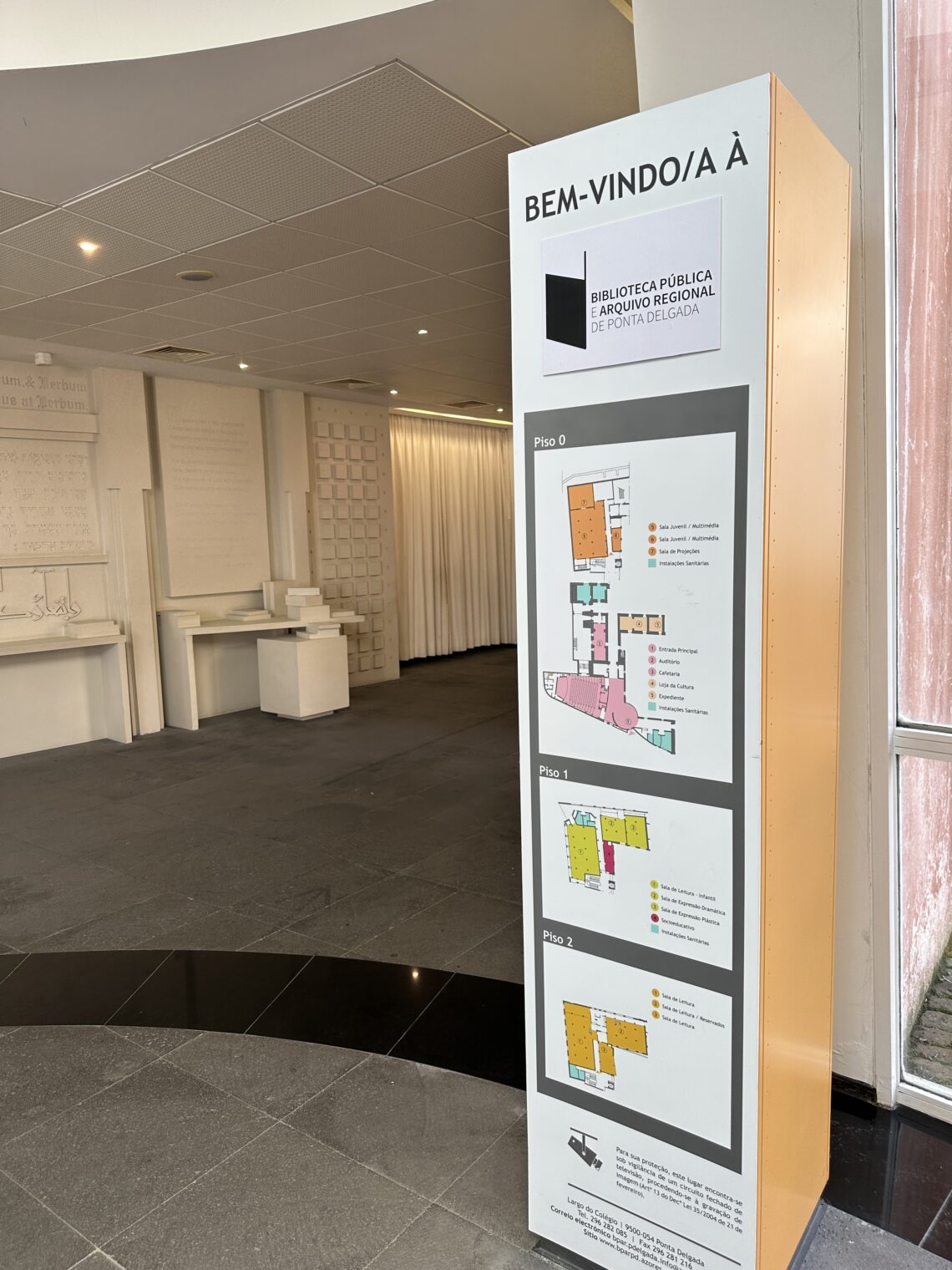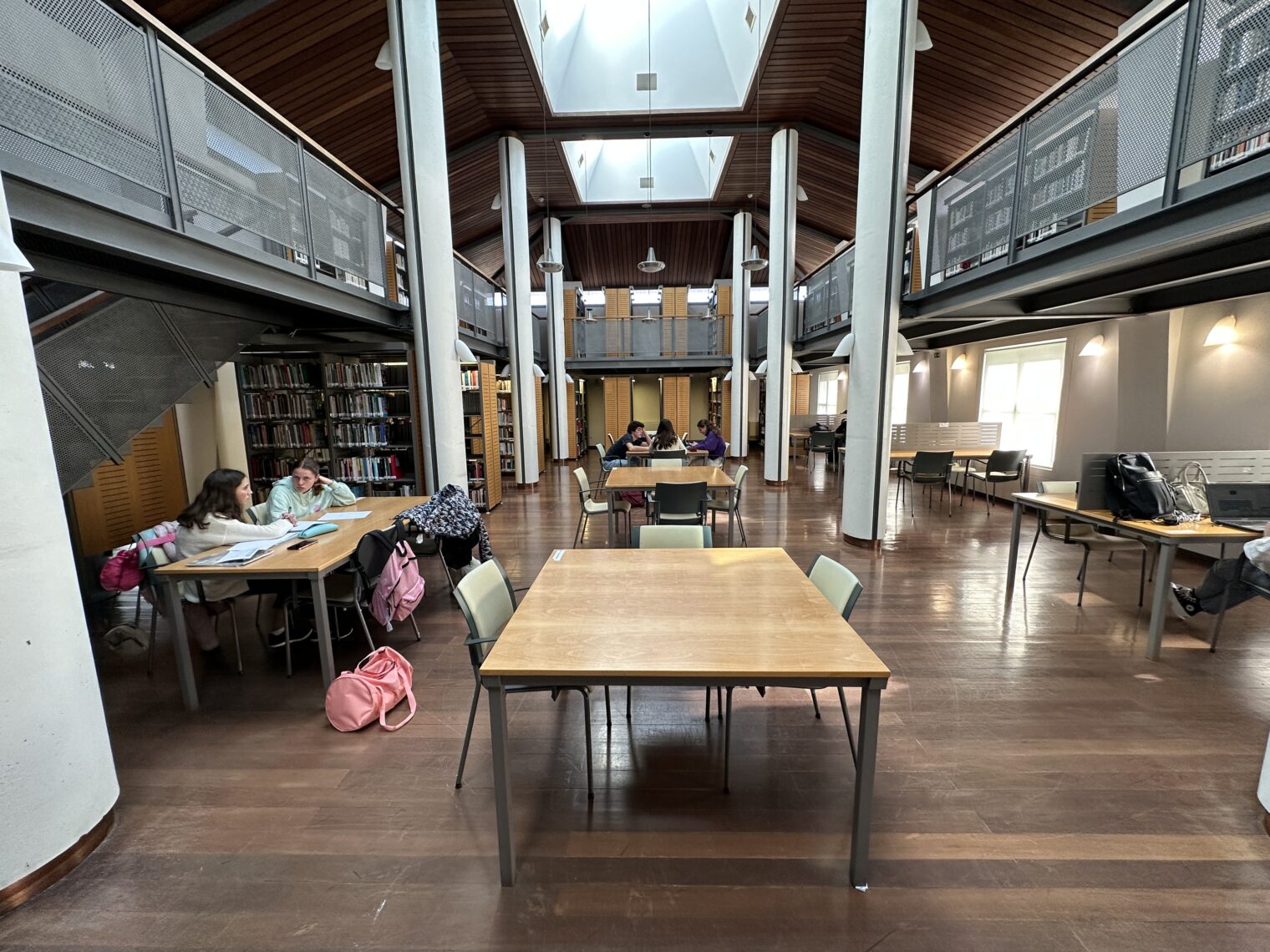As a companion to my pieces on what public libraries offer in Palm Beach County (in Florida, where books are purportedly banned) and in Maskachusetts, some March 13, 2023 images from a library in Ponta Delgada, Portugal.
What’s the neighborhood like? Here’s the building next door, a museum of sacred art:
Who uses the library on a Monday late afternoon? A lot of studious school kids:
Does the library promote social justice? Here are the books recommended for adults:





I would love to see someone actually read that 700-page book on Max Weber (who envisioned our current bureaucratic world)!
Are there books on skin-color-based victimhood promoted to children? I don’t think so. Here’s the rack:
(I thought that “O Protesto” might be about a mostly peaceful social justice protest, but the star is a gorilla rather than a martyr in the struggle against racism.)
The library seems to take a more neutral position on what to read than do its counterparts in the U.S. A larger majority of books are simply shelved spines out. My Portuguese wasn’t good enough to enable me to identify the 2SLGBTQQIA+ section within the teens’ room so I don’t know whether they have anything corresponding to what we found in Cambridge last week:
The library devotes a fair amount of space to Portugal’s Nobel laureate in literature, José Saramago. I had no idea that he wrote a badly-reviewed travel guide to Portugal.


The library has a complex layout due to its location in a historic building. There is a nice little café for patrons.


Overall, there seems to be much less emphasis on the divisions among groups within Portuguese society than one finds in U.S. libraries regarding divisions among groups within American society.




Guess the blog is going to be headquartered in Portugal eventually. The mane question for lions is how much it costs to live there. Obviously a stupid question in Greenspun terms.
lion: For the basics of a comfortable house, a comfortable car, and food from the supermarket, Portugal is probably more expensive than a lot of places in the middle of the U.S. Thanks to all of the land and resources that we stole from the Native Americans, there is no way to beat U.S. efficiency. On the other hand, if you want the stuff that rich people buy in the U.S., e.g., mountain or ocean scenery, luxury hotels and restaurants, personal service, etc., Portugal is cheaper than the places in the U.S. where rich people crowd together, e.g., migrant-free Martha’s Vineyard. A great dinner with warm friendly service was about $25 in Ponta Delgada and something comparable would have been perhaps $60-70 in elite coastal parts of the U.S.
That’s a beautiful library. I’m enjoying your posts about Portugal – keep ‘em coming!
I have some good picture of Portugal too, from a new member of my extended family. Here’s my sincere advice: Move there. Make plans now, and don’t wait ten years, because by then the United States is going to be a very different and unpleasant place to live.
Addendum: I also conjecture that ***NOPLACE ELSE IN THE WORLD*** other than the United States and possibly some parts of upper-middle class Britain has the Woke Brain Disease infected the educated, elite “influencer and opinion shaper” class. Unfortunately there is no cure. When the Cambridge Public Library in Massachusetts is openly **LYING** to young people about the invention of **TELEVISION** I know they will lie about anything that moves their agenda forward. We’re raising a new generation of elite kids who are going to run the managerial and executive functions of this country and we are educating them to be brain-damaged. That’s the tip of the proverbial iceberg when there are also things like ZERO students in more than 50 Chicago public schools who can function at their grade level. But Randi Weingarten still has her job.
And on and on.
This country is going to disintegrate at every level, it’s going to fray and rip itself apart like a sail that has torn loose in an ocean storm, and there isn’t anyone who has a boat big enough to rescue us.
I actually found myself agreeing halfway with Obrador when he said that the United States has the fentanyl crisis because of social decay. It’s true. He’s right. He’s helping to cause it with the assistance of the Chinese, so he should damn well know what the plan is.
In many US cities the public spaces like libraries have been taken over by vagrants and the drug addled. When you travel in European cities, in fact most cities in the world, you don’s see that. Would be interesting to find out in e.g. Portugal why this hasn’t happened. Fewer drug addicts & deranged? They are shuffled off somewhere?
They do crazy socialist stuff like national health care and treating drugs as a medical rather than criminal problem.
LinePilot, in Europe, also states with conservative government have national health care (which is deteriorating in last ~ 30 years more or less in all states, independent of government). In most states drug problem is treated as both medical and criminal problem AFAIK, good combination of both is probably the best solution. Religious communes for drug addicts, which give them long time opportunities to remove themselves from their former life, and learn and start new life, are probably important part of long term solution, I think Spain and Italy have many. This opinion is based solely on anecdotal evidence, from the stories I have heard (not being particularly religious myself).
National health care in the US is Medicaid and Medicare. The majority of people with opioid and heroin misuse disorder (not “addicts”) got hooked via Medicaid-purchased OxyContin and competitors. See https://philip.greenspun.com/blog/2016/12/21/who-funded-americas-opiate-epidemic-you-did/ for example.
A typical American national health care example… “ Dante A. Cubangbang, 50, who helped run a medical clinic in Queens, and a nurse practitioner prescribed 3.3 million pills that were paid for by Medicare and Medicaid over a three-year period — making him the highest prescriber in the state, one indictment says.” https://www.nytimes.com/2018/10/11/nyregion/doctors-charged-opioid-prescriptions.html
Phil, I think that Obama’s health care was combining the worst parts from state owned national health care, and from purely private health care. This is my opinion built mostly on information from this blog. When I mentioned it to someone living in USA (and who had became woke fascist in meantime), he had to agree that Obama’s health care system is very bad, but defended it: “At least they have done something, and people have healthcare now, and you can not take it from them any more”. I should have said: “It is like defending blood-letting in middle ages – at least they’ve done something”, but it came to me later.
Opoid crisis is example of huge corruption in medical system (pharma, FDA, medical doctors), and not caused by problems in health insurances IMHO (both are symptoms of same problem, corruption).
National health care systems in Europe are deteriorating, in different ways, mostly caused by corruption I believe, maybe also by population becoming to old, and good care of old people becoming not affordable.
I still believe that state owned national health care, which provides only basic, not extremely expensive health care, would solve 99% of the health/financial problems. If you want something better, you should pay, and those two worlds should be strictly separated. But this can probably not be done. I can see journalist presenting some ill child, crying how human life has no price, and that state owned health care should pay for everything, or lamenting how everyone deserves best health care. And people are buying it, so in order to improve non perfect system, we end up with rotten system.
I can remember, 40 years ago in western Europe, people were lamenting how they have two thirds society, inhuman and unjust, good only for two thirds of society, and bad for the weakest third. They’ve done great job repairing it, now they have one tenth society, good only for the strongest tenth.
I hate to break it to you Phil, but the Portugal library has an American section, you need to look for it and that’s where you will find all your favorite social justice books.
I’d suspect that the language barrier has much to do with it. Most of the culture wars are taking place in English, and so the non Anglo speakers have so far been left out of the fight.
This might change if true simultaneous translation takes off.
Ponta Delgada! That’s way out in the Atlantic, I should think it would be pricier than the mainland. But take a place like Lagos — when we told our host in Coimbra (in the North) we were headed there he remarked that we were leaving the Portuguese part of Portugal. The Algarve is crawling with expats, lots of Brits, Germans…it’s said that the biggest Swedish RE agency is in Portugal. Between the international chain Aldi, the local chain Pingo Doce, and Intermarche there’s plenty of competition in supermarkets and the freshest fish and produce (in great variety) can be found at the traditional mercado downtown.
The Portuguese don’t hold with begging. I saw very few street people in Lisbon, and in Lagos I was standing behind one local to get into the mercado, waiting while she upbraided some *gypsy*? I couldn’t parse much Portuguese but I caught “I work for a living what’s your problem…!”
In the lobby of one of those public elevators used in Lisbon to overcome the vertiginous streets, I was following a group of Portuguese tourists who had had some questions for the attendant. As they moved out of earshot I caught something about, “You’re in Portugal now, how about speaking Portuguese!” in reference to the guard’s Brazilian accent.
Speaking of speaking Portuguese, trying out my pathetic Portuguese on store clerks, more than once I was asked — in English — “Are you French?”
But one can’t say Portugal has not been enriched by diversity. The prettiest women I saw there were quite evidently Brasileiras.
The Portuguese are not much for clothes dryers, relying on clotheslines strung across balconies. An eight story apartment building festooned with laundry is a sight to behold.